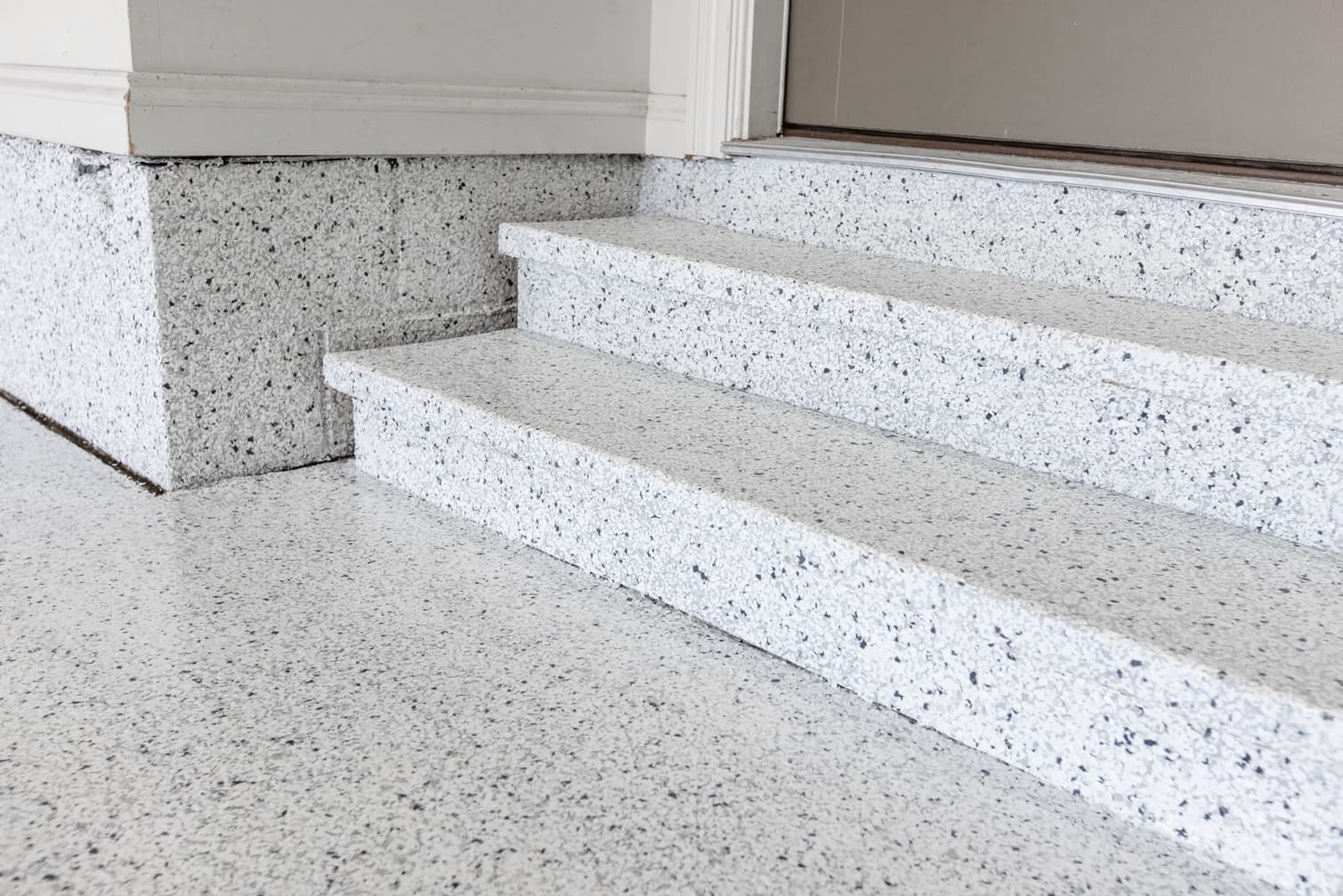
FAQ
You have questions? We’ve Got answers
Garage Floor Coating FAQ
-
How Long Does The Process Take?
Our installation usually takes 1 full day, although some make take longer. Garages larger than 3 cars or that require a moisture barrier could take up to 2 days.
-
Does the process create a lot of dust?
No, all of our tools are connected to industrial vacuums that have HEPA filters. This means we are sucking up all the dust and debris as we work, leaving your garage as clean or cleaner than when we started. We know you hired us to make your garage amazing, not dirty
-
Will you empty my garage for me?
We require that your garage is empty on the day of your appointment. If you need help with a specific item please let us know, as we may be able to help. Movers have also helped some of our customers.
-
What should I do with my stuff?
We require that your garage is empty on the day of your appointment. Our customers generally put their stuff in their yard or driveway for 1 night. If that isn’t an option, you could rent a trailer or a pod for a day or 2 so you can move you stuff into a secure space. Depending on the day of your job, we may have a trailer available for you.
-
How long do I have to stay off the floor?
The floor will be ready to walk on in 4 hours but we suggest not moving any heavy items onto your floor (refrigerators, cars, etc.) for 24 hours.
-
What type of warranty do you offer?
We offer a lifetime warranty backed by us. If anything goes wrong, we will fix it (see warranty sheet for details). Other companies’ warranties may be backed by the manufacturer, which can make it really difficult to make a claim.
-
What if my garage floor has damaged or has cracks in it?
We can resolve most chips, cracks and areas that may need leveling. We use a concrete mender that bonds to the cement and is five times stronger than concrete. It is very unlikely that a mended crack will crack again or disturb the finished coating.
-
Can you do areas besides garage floors?
Yes, we can do concrete just about anywhere, including outside. If you have a unique project like a basement, pool deck, restaurant, porch, or something else, we can likely help you. Our product is UV stable, which means it won’t fade or discolor over time, like some other products on the market.
-
How does your product compare to other products?
That is up to you depending on the results you desire, how long you would like the product to last, and the amount of money you want to spend. Painting your floor may be cheap ($1.75/sq-ft), but the surface can easily chip and fade soon after it is applied.
An epoxy floor coating is more expensive than painting ($3-$7/sq-ft), but is more durable. However, epoxy is likely to fade, discolor, turn yellow, and even crack since epoxy is not flexible.
Epoxy floors can take up to four days to install and seven days to fully cure before you can drive
or put heavy equipment back on it. Epoxy also releases a significant amount of VOCs.
Our Method: Poly-aspartic coating, is a “newer technology”. When using this method, you get unmatched strength and durability, as well as virtually no VOCs. Our coatings are generally in the same price range as epoxy floor coatings but are much more flexible than epoxy and 100%
UV resistant – less likely to fade or yellow in direct sunlight. Our product is also more resistant to
most types of chemicals which makes it a great solution for garages, commercial floors, and
industrial applications. Hospitals love us because our coatings are 100% anti-microbial and 100% anti-bacterial resistant. Our coatings can be walked on in 4 hours and driven on as soon as 24 hours after installation. -
Will my floor be slippery?
Whether wet or dry, our floor coatings are slip-resistant and ideal for indoor (like workspaces) or outdoor (like patios and pools) scenarios. Although they look beautiful and shiny, the floors have a slight orange-peel texture that makes for a great gripping surface.
Epoxy Garage Floor Coatings FAQ
-
What is epoxy garage floor coating?
Epoxy garage floor coating is a durable and protective layer made from epoxy resin and hardeners that is applied to garage floors. It provides a strong and attractive surface that can withstand heavy use.
-
What are the benefits of using epoxy coatings on garage floors?
Epoxy coatings offer benefits such as increased durability, resistance to stains and chemicals, easy maintenance, improved aesthetics, and enhanced light reflection.
-
Can epoxy coatings be applied to any type of garage floor?
Epoxy coatings work well on concrete and cement-based floors. However, floors with moisture issues may require special attention before application.
-
How long can I expect an epoxy garage floor coating to last?
With proper care and maintenance, epoxy coatings can last anywhere from 5 to 10 years or more. This is why we prefer a polyaspartic coating, they last a lot longer!
-
Can I customize the appearance of my epoxy-coated floor?
Yes, epoxy coatings come in various colors and finishes. You can also add decorative elements like colored flakes or metallic pigments to achieve a personalized look.
-
How long does it take to apply epoxy coating to a garage floor?
The application process typically takes a few days, including preparation, coating application, and curing time. This is why we use a polyaspartic coating with quicker curing times. A typical garage is completed in 1 dy.
-
When can I use my garage after applying epoxy coating?
Most epoxy coatings require at least 24 to 72 hours of curing time before light foot traffic. Heavy objects and vehicles should be kept off for about a week. Another reason we prefer a polyaspartic coating, plan on 24-36 hours before parking in garage.
-
Is epoxy coating resistant to chemicals and oil spills?
Yes, epoxy coatings are known for their resistance to chemicals, oils, and stains, making them an ideal choice for garages.
-
Can I repair a damaged epoxy-coated floor?
Minor damages like scratches can often be repaired by applying a new coat of epoxy. Contact a professional to see what is needed.
-
How should I clean and maintain my epoxy-coated floor?
Regular sweeping and occasional mopping with a gentle detergent are usually sufficient. Avoid harsh chemicals that could damage the epoxy finish.
-
Is epoxy flooring slippery?
Epoxy coatings can be slippery when wet. To enhance safety, consider using anti-slip additives in the topcoat or adding textured finishes.
-
Can epoxy coating withstand extreme temperatures?
Standard epoxy coatings might struggle with extreme temperatures, so specialized formulations may be required for climates with significant temperature variations.
-
Can epoxy be applied over existing paint or coatings?
In some cases, epoxy can be applied over existing coatings, but proper surface preparation is essential for adhesion.
-
Can epoxy coating be removed if needed?
Epoxy coatings can be removed through grinding or chemical stripping, but it can be a labor-intensive process.
Polyaspartic Garage Floor Coatings faq
-
What is polyaspartic garage floor coating?
Polyaspartic garage floor coating is a type of high-performance coating made from polyaspartic polyurea. It offers durability, chemical resistance, and quick curing times compared to traditional epoxy coatings.
-
What are the advantages of using polyaspartic coatings on garage floors?
Polyaspartic coatings offer benefits such as rapid cure times (typically in a single day), excellent durability, resistance to chemicals and abrasions, UV stability, and a glossy finish.
-
How do I prepare my garage floor for polyaspartic coating?
Surface preparation involves cleaning the floor thoroughly, repairing any damage or cracks, and ensuring the surface is free from contaminants for proper adhesion.
-
Can polyaspartic coatings be applied to any type of garage floor?
Polyaspartic coatings can adhere well to concrete, cement, and other suitable surfaces. Proper surface preparation is crucial for a successful application.
-
How long does a polyaspartic garage floor coating last?
With proper care and maintenance, a polyaspartic coating can last around 20 years.
-
Is customization possible with polyaspartic-coated floors?
Yes, you can choose from a variety of colors, finishes, and even add decorative elements like flakes or metallic pigments for a unique look.
-
What is the application time for polyaspartic coatings on a garage floor?
Polyaspartic coatings have a rapid cure time, usually within a day. This means you can return your garage to normal use quickly.
-
When can I use my garage after applying polyaspartic coating?
You can typically use your garage within 24 hours of the application of polyaspartic coating, making it a convenient option.
-
Is polyaspartic coating resistant to chemicals and oil spills?
Yes, polyaspartic coatings are known for their exceptional resistance to chemicals, oils, and stains, making them ideal for garages.
-
How should I clean and maintain my polyaspartic-coated floor?
Regular sweeping and mopping with a mild detergent should keep your floor looking great. Avoid harsh chemicals that could damage the coating.
-
Is a polyaspartic floor slippery when wet?
Polyaspartic coatings can be slippery when wet. Incorporating an anti-slip additive into the topcoat can improve traction.
-
Can polyaspartic coatings handle extreme temperatures?
Polyaspartic coatings are known for their temperature tolerance and can be applied in various climates, including those with temperature fluctuations.
-
Can I apply polyaspartic coating to a damp floor?
Unlike some coatings, polyaspartic coatings can be applied to slightly damp surfaces, making them more versatile in humid conditions.
-
Can I add multiple layers of polyaspartic coating for extra durability?
Polyaspartic coatings are typically applied in a single layer due to their quick cure time. Consult with professionals for specific recommendations.
-
Can polyaspartic coating be removed if necessary?
Polyaspartic coatings can be removed using mechanical methods, but it’s a labor-intensive process.
Epoxy vs polyaspartic faq
-
What are epoxy and polyaspartic garage floor coatings?
Epoxy and polyaspartic coatings are durable finishes applied to garage floors to protect and enhance their appearance.
-
What’s the main difference between epoxy and polyaspartic coatings?
Epoxy coatings offer strong durability and adhesion, while polyaspartic coatings provide rapid cure times and UV resistance.
-
Which one is easier to apply, epoxy or polyaspartic?
Polyaspartic coatings tend to be easier to apply due to their shorter cure times and forgiving application characteristics.
-
How long does it take for epoxy coatings to cure?
Epoxy coatings typically take around 24 to 72 hours to fully cure, depending on temperature and humidity levels.
-
What’s the cure time for polyaspartic coatings?
Polyaspartic coatings have a much quicker cure time of around 1 to 4 hours, making them ideal for fast installations.
-
Which coating is more resistant to UV rays?
Polyaspartic coatings have better UV resistance compared to epoxy coatings, making them suitable for outdoor applications.
-
Are both coatings resistant to chemicals and stains?
Yes, both epoxy and polyaspartic coatings offer excellent resistance to chemicals, oils, and stains.
-
Can I apply epoxy and polyaspartic coatings myself, or should I hire a professional?
While both coatings can be applied by DIY enthusiasts, hiring a professional ensures a proper application and longer-lasting results.
-
Can these coatings be applied to old, damaged garage floors?
Yes, both epoxy and polyaspartic coatings can be applied to older garage floors, provided they are properly prepared.
-
Do epoxy and polyaspartic coatings have odor during application?
Epoxy coatings tend to have a stronger odor during application compared to polyaspartic coatings.
-
How do I clean and maintain floors coated with epoxy or polyaspartic?
Regular sweeping and gentle cleaning with a mild detergent and water are sufficient for maintenance. Avoid harsh chemicals.
-
Can I drive on the coated garage floor immediately after installation?
With polyaspartic coatings, you can usually drive on the floor within 24 hours. Epoxy coatings may require a longer curing time.
-
Are epoxy and polyaspartic coatings suitable for areas with temperature fluctuations?
Both coatings are designed to handle temperature fluctuations, but polyaspartic coatings might perform better in extreme conditions.
how does polyaspartic compare to epoxy?
| Polyaspartic Coatings | Epoxy Concrete Coatings | |
|---|---|---|
| Installation | 1 Day | 3+ Days |
| Dry Time | 4 Hours | 1 Day between each layer |
| UV Durability | Won’t discolor in sunlight | Will yellow over time |
| Applications | Indoor and Outdoor | Indoor Only |
| Durability | Hard, flexible finish, resistant to chipping, craking, pealing, and abrasion | Hard, vulnerable to chipping, cracking, pealing, abrasion |
| Overall Strength | High | Low |
| DIY Installation | Not typically available | Home Improvement Store, not recommended |
| Air Quality | Certified Low VOC, virtually no odor | High VOC, outgassing can impact air quality |
| Price | More expensive | Less expensive |

